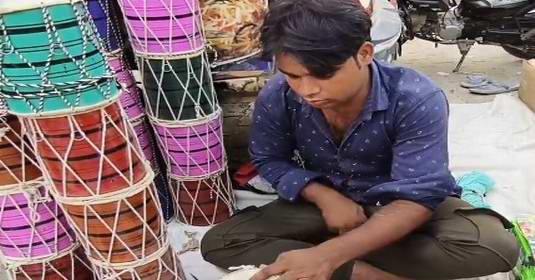How the drum used in bhajan-kirtan is made, know the complete process
New Delhi: The demand for special Dholak prepared by artisans is increasing in the district. Their ancestors have been making dholak for hundreds of years. Now Nadeem is also taking this work forward. His workmanship is so excellent that orders are being received from many districts. Nadeem told Local18 that he is carrying forward his ancestral work. He had learned the art of making dholak from his ancestors.
Today, to make dholak, he first asks for a different type of wood from Assam. After this, after cleaning it, big holes are made on both the veins. Then after carving it, painting it with colorful colors, it is sold. After this, these drums are sold at the right rate according to their quality. At present his business has spread not only to Farrukhabad but to many districts of the state. He earns good income from this business.
Even though its popularity has reduced in today's times, the artisans who make them are still earning money by making them. Dholak making artisans are carrying forward their traditional work in Farrukhabad, Uttar Pradesh. In their place, after heating a different type of rosewood and mango wood in fire, small holes are made in it. Due to this, every frequency coming inside it becomes a melodious tune.
Since ancient times, be it any auspicious event, katha event, festival, or entertainment, Dholak is present everywhere. The main reason for this is that its beats enhance the atmosphere. This is the reason why this business of making dholak has been flourishing for hundreds of years. Here, Dholak is available for Rs 150 to Rs 2000.
Mango and rosewood wood are very special. This wood is especially used in making the parts of the dholak. In such a situation, strong and durable wood is required to make Dholak. The best wood is used for this. Whenever orders come to these businessmen in Farrukhabad, they deliver the orders to all the customers on time.
The post How the drum used in bhajan-kirtan is made, know the complete process appeared first on Read.


Comments are closed.